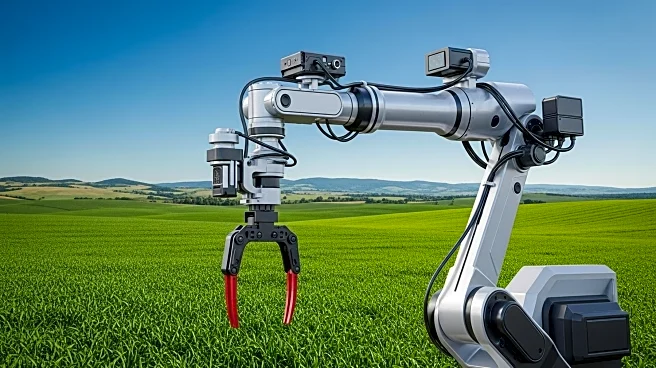What's Happening?
Smart agriculture is undergoing a transformation with the integration of AI, agri-robotics, and IoT technologies. These advancements are automating traditionally labor-intensive tasks such as weed removal, seeding, and harvesting, allowing for greater precision and efficiency. Machine-vision systems are being utilized for real-time crop health and pest management, while IoT networks enhance supply-chain traceability and quality control. The use of autonomous vehicles and networked sensors is empowering farmers to reduce overhead costs and environmental impacts. As these technologies become more scalable, the cost-benefit ratio is increasingly favorable for growers, particularly benefiting family-run agribusinesses and smallholders.
Why It's Important?
The integration of AI and agri-robotics in agriculture is significant for several reasons. It offers a solution to labor shortages by reducing dependency on seasonal workers, thus providing resilience against climate change impacts. These technologies contribute to sustainability by minimizing environmental footprints and enhancing food security through improved efficiency and precision in farming practices. The adoption of smart agriculture technologies can lead to increased productivity and profitability for farmers, potentially transforming the agricultural industry and supporting global food security efforts.
What's Next?
As smart agriculture technologies continue to evolve, further adoption by farmers is expected, driven by the favorable cost-benefit ratio. This could lead to widespread changes in farming practices, with increased automation and precision agriculture becoming the norm. Stakeholders such as agribusinesses, technology developers, and policymakers may focus on enhancing these technologies and addressing challenges related to scalability and accessibility. The ongoing development of smart agriculture could also prompt discussions on regulatory frameworks and support systems to facilitate the transition.
Beyond the Headlines
The shift towards smart agriculture raises ethical and cultural considerations, such as the impact on traditional farming communities and the potential loss of jobs due to automation. It also highlights the need for education and training programs to equip farmers with the skills necessary to operate advanced technologies. Long-term, these developments could lead to a redefinition of agricultural practices and the role of human labor in farming.










